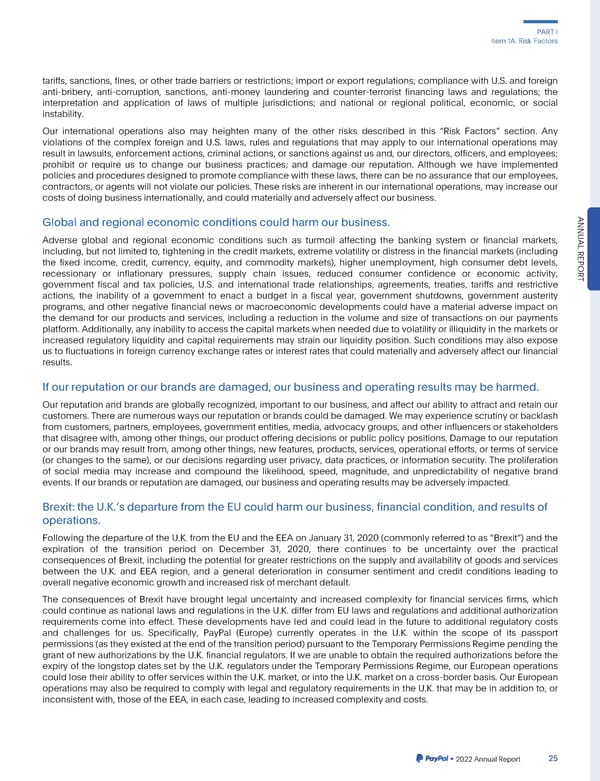PARTI Item1A.RiskFactors tariffs, sanctions, fines, or other trade barriers or restrictions; import or export regulations; compliance with U.S. and foreign anti-bribery, anti-corruption, sanctions, anti-money laundering and counter-terrorist financing laws and regulations; the interpretation and application of laws of multiple jurisdictions; and national or regional political, economic, or social instability. Our international operations also may heighten many of the other risks described in this “Risk Factors” section. Any violations of the complex foreign and U.S. laws, rules and regulations that may apply to our international operations may result in lawsuits, enforcement actions, criminal actions, or sanctions against us and, our directors, officers, and employees; prohibit or require us to change our business practices; and damage our reputation. Although we have implemented policies and proceduresdesignedto promotecompliancewiththeselaws,therecanbenoassurancethatouremployees, contractors, or agents will not violate our policies. These risks are inherent in our international operations, may increase our costsofdoingbusinessinternationally,andcouldmateriallyandadverselyaffectourbusiness. Globalandregionaleconomicconditionscouldharmourbusiness. ANNU Adverse global and regional economic conditions such as turmoil affecting the banking system or financial markets, AL including, but not limited to, tightening in the credit markets, extreme volatility or distress in the financial markets (including REPOR the fixed income, credit, currency, equity, and commodity markets), higher unemployment, high consumer debt levels, recessionary or inflationary pressures, supply chain issues, reduced consumer confidence or economic activity, government fiscal and tax policies, U.S. and international trade relationships, agreements, treaties, tariffs and restrictive T actions, the inability of a government to enact a budget in a fiscal year, government shutdowns, government austerity programs, and other negative financial news or macroeconomic developments could have a material adverse impact on the demand for our products and services, including a reduction in the volume and size of transactions on our payments platform. Additionally, any inability to access the capital markets when needed due to volatility or illiquidity in the markets or increased regulatory liquidity and capital requirements may strain our liquidity position. Such conditions may also expose us to fluctuations in foreign currency exchange rates or interest rates that could materially and adversely affect our financial results. If our reputation or our brands are damaged, our businessand operatingresults may be harmed. Ourreputation and brands are globally recognized, important to our business, and affect our ability to attract and retain our customers.Therearenumerouswaysourreputationorbrandscouldbedamaged.Wemayexperiencescrutinyorbacklash from customers, partners, employees, government entities, media, advocacy groups, and other influencers or stakeholders that disagree with, among other things, our product offering decisions or public policy positions. Damage to our reputation or our brands may result from, among other things, new features, products, services, operational efforts, or terms of service (or changes to the same), or our decisions regarding user privacy, data practices, or information security. The proliferation of social media may increase and compound the likelihood, speed, magnitude, and unpredictability of negative brand events.If our brands or reputation are damaged,our businessand operatingresultsmay be adverselyimpacted. Brexit: the U.K.s departure from the EU could harm our business, financial condition, and results of operations. Following the departure of the U.K. from the EU and the EEA on January 31, 2020 (commonly referred to as “Brexit”) and the expiration of the transition period on December 31, 2020, there continues to be uncertainty over the practical consequencesof Brexit, including the potential for greater restrictions on the supply and availability of goods and services between the U.K. and EEA region, and a general deterioration in consumer sentiment and credit conditions leading to overall negative economicgrowthandincreasedriskofmerchantdefault. The consequences of Brexit have brought legal uncertainty and increased complexity for financial services firms, which could continue as national laws and regulations in the U.K. differ from EU laws and regulations and additional authorization requirements come into effect. These developments have led and could lead in the future to additional regulatory costs and challenges for us. Specifically, PayPal (Europe) currently operates in the U.K. within the scope of its passport permissions(astheyexistedattheendofthetransitionperiod)pursuanttotheTemporaryPermissionsRegimependingthe grant of new authorizations by the U.K. financial regulators. If we are unable to obtain the required authorizations before the expiry of the longstop dates set by the U.K. regulators under the Temporary Permissions Regime, our European operations could lose their ability to offer services within the U.K. market, or into the U.K. market on a cross-border basis. Our European operations may also be required to comply with legal and regulatory requirements in the U.K. that may be in addition to, or inconsistentwith, those of the EEA, in each case, leading to increasedcomplexityand costs. •2022AnnualReport 25
 2023 Annual Report Page 172 Page 174
2023 Annual Report Page 172 Page 174